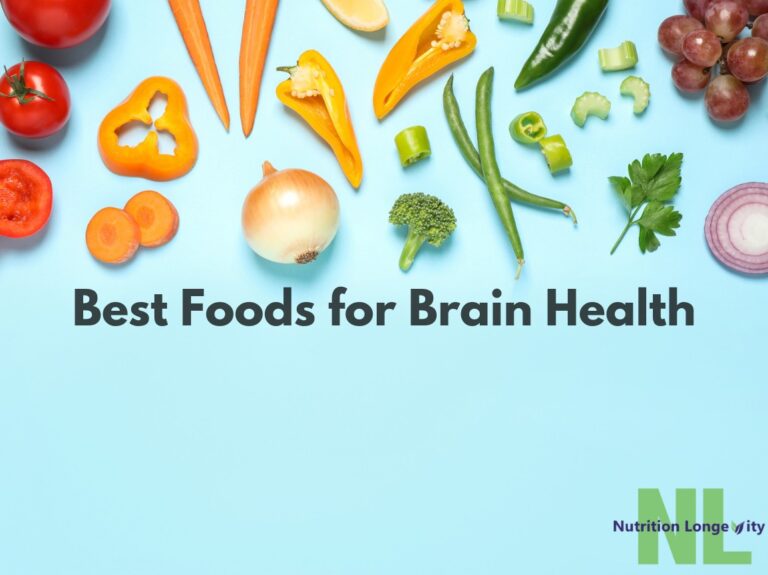Best Foods for Brain Health
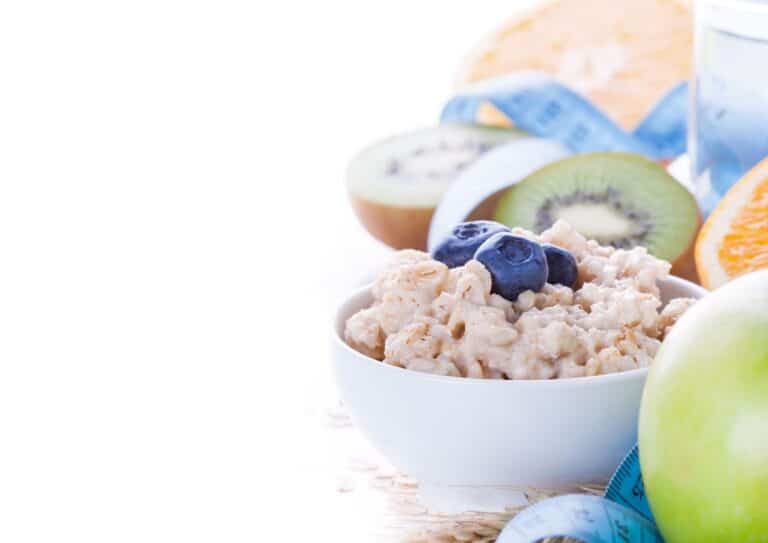
What Are the Best Foods for Brain Health?
When it comes to maintaining optimal brain health, the foods we consume play a vital role in supporting cognitive function and overall well-being. A well-balanced diet rich in specific nutrients can help enhance memory, boost mood, and protect against age-related cognitive decline. The right combination of nutrients not only fuels the brain but also promotes the growth of new brain cells, improves communication between brain cells, and reduces inflammation.
Incorporating a variety of nutrient-dense foods into your daily meals can provide the essential vitamins, minerals, and fatty acids needed for brain development and function. From antioxidant-rich berries to omega-3 fatty acids found in fatty fish, each food offers unique benefits that contribute to cognitive health.
Jake Biggs, a prominent clinical nutritionist, provides both online and face-to-face consultations, guiding you on the best foods to enhance cognitive function and overall brain health. Your complete guide on what are the best foods for your brain health!
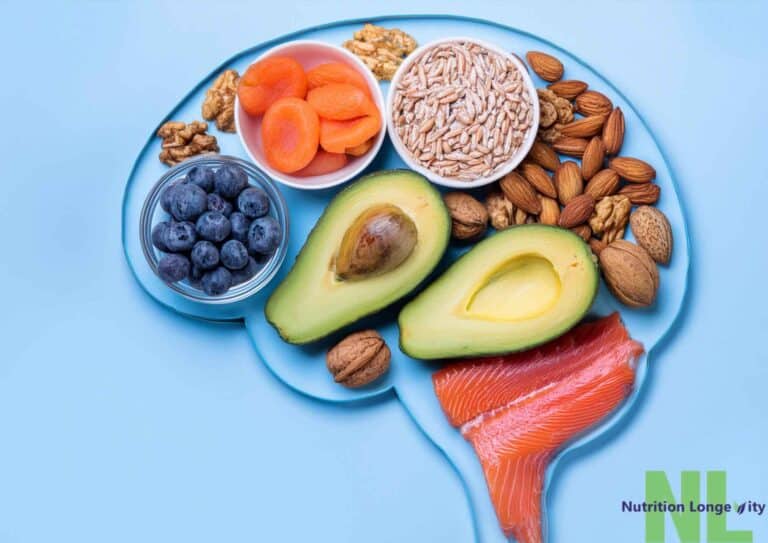
The best foods for brain health:

Salmon
Salmon and Brain Health: Salmon is renowned for its numerous health benefits, particularly for brain health, due to its high content of omega-3 fatty acids, specifically EPA (eicosapentaenoic acid) and DHA (docosahexaenoic acid). These omega-3 fatty acids are essential fats that play a crucial role in maintaining brain health. DHA is a major structural component of the brain and is vital for cognitive function and neurodevelopment. Research published in the Journal of Nutritional Biochemistry found that a higher intake of omega-3 fatty acids was associated with improved cognitive function and a lower risk of neurodegenerative diseases such as Alzheimer’s disease (Yurko-Mauro et al., 2010).
Supports Neuroplasticity: Salmon consumption can enhance neuroplasticity, which is the brain’s ability to reorganise itself by forming new neural connections throughout life. This process is crucial for learning and memory. A study in Frontiers in Aging Neuroscience demonstrated that omega-3 supplementation, including DHA, improved synaptic plasticity and memory performance in ageing rats, indicating similar potential benefits in humans (Gómez-Pinilla, 2008).
Anti-Inflammatory Properties: Chronic inflammation in the brain can lead to cognitive decline and neurodegenerative diseases, and omega-3 fatty acids in salmon possess anti-inflammatory properties that may help reduce inflammation. Research published in Nature Reviews Neuroscience highlights these anti-inflammatory effects of omega-3 fatty acids and their role in protecting against cognitive decline and mental health disorders (Hammond, 2009).
Enhances Mood and Mental Health: The consumption of salmon has been linked to improvements in mood and reductions in symptoms of depression and anxiety, which can impact cognitive function. A study in Psychological Medicine indicated that higher omega-3 fatty acid intake was associated with a lower risk of depression, suggesting that omega-3s, particularly from sources like salmon, may play a protective role (Li et al., 2016).
Promotes Brain Development: For children, the intake of omega-3 fatty acids from salmon is crucial for brain development and function. A study published in Pediatric Research demonstrated that maternal consumption of omega-3 fatty acids during pregnancy and lactation was associated with improved cognitive outcomes in children (Gonzalez-Casanova et al., 2018).
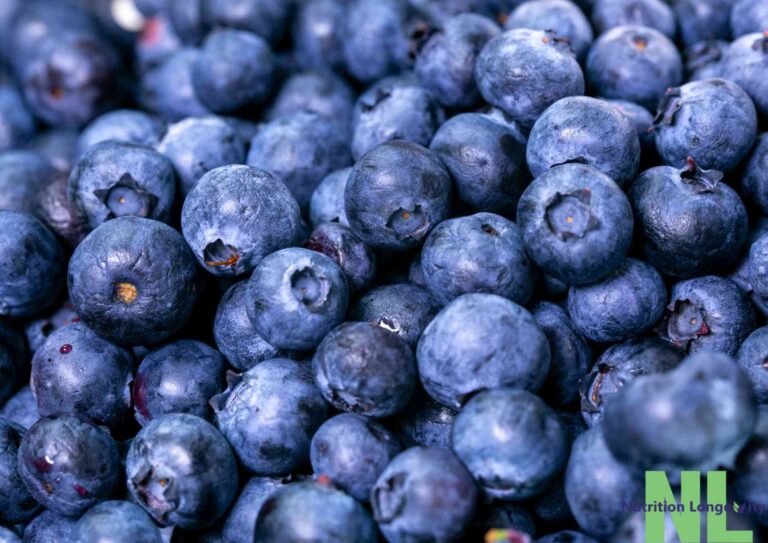
Blueberries
Blueberries and Brain Health: Blueberries are packed with antioxidants, particularly flavonoids, which are known to have significant benefits for brain health. These antioxidants help combat oxidative stress and inflammation, both of which are linked to cognitive decline. Research published in Nutritional Neuroscience found that regular consumption of blueberries is associated with improved memory and cognitive function, especially in older adults (Kalt et al., 2018).
Improves Communication Between Brain Cells: The compounds in blueberries can enhance communication between brain cells, supporting overall cognitive function. A study in Frontiers in Aging Neuroscience showed that blueberry supplementation improved spatial working memory in older adults, indicating that these berries may help maintain cognitive abilities as we age (Batrakova et al., 2021).
Delays Brain Aging: Blueberries may also help delay brain aging and improve brain plasticity, which is essential for learning and memory. A study published in The Journal of Agricultural and Food Chemistry demonstrated that the polyphenols in blueberries can promote neurogenesis, the process of generating new neurons, which is vital for cognitive health (Mishra et al., 2019).
Reduces Inflammation: The anti-inflammatory properties of blueberries play a crucial role in brain health. Chronic inflammation is associated with neurodegenerative diseases, and the antioxidants found in blueberries can help reduce this inflammation. A study in Neurobiology of Aging highlighted that blueberry supplementation led to decreased inflammatory markers in the brain, potentially protecting against cognitive decline (Kalt et al., 2014).
Supports Mood and Mental Wellbeing: Blueberries may also have a positive impact on mood and mental wellbeing. Research published in The Journal of Nutritional Biochemistry found that flavonoids in blueberries can enhance mood and cognitive performance, particularly under stress (Gomez-Pinilla, 2008).

Turmeric
Turmeric and Brain Health: Turmeric is a spice that contains curcumin, a potent compound known for its anti-inflammatory and antioxidant properties. These attributes make turmeric particularly beneficial for brain health, as they help combat oxidative stress and inflammation, both of which can contribute to cognitive decline. Research published in the Journal of Medicinal Food found that curcumin can enhance cognitive function and has potential neuroprotective effects, making it a valuable addition to a brain-healthy diet (Hewlings & Kalman, 2017).
Enhances Memory: Curcumin may also enhance memory and cognitive performance. A study published in The American Journal of Geriatric Psychiatry found that daily supplementation with curcumin significantly improved memory and attention in older adults with mild cognitive impairment, suggesting that it may help protect against age-related cognitive decline (Small et al., 2014).
Stimulates the Growth of New Brain Cells: One of the remarkable properties of curcumin is its ability to stimulate the production of brain-derived neurotrophic factor (BDNF), a protein that supports the growth and survival of neurons. Low levels of BDNF are linked to various brain disorders, including depression and Alzheimer’s disease. A study in Frontiers in Aging Neuroscience demonstrated that curcumin supplementation increased BDNF levels, indicating its potential to promote neurogenesis and improve cognitive function (Zhang et al., 2018).
Reduces Inflammation in the Brain: Chronic inflammation in the brain is a significant factor in the development of neurodegenerative diseases. Curcumin’s anti-inflammatory properties may help reduce this inflammation, offering protective effects for brain health. A study published in Neuroscience Letters showed that curcumin reduced levels of pro-inflammatory cytokines in the brain, suggesting its potential as a therapeutic agent for neuroinflammatory conditions (Khan et al., 2016).
Supports Mood and Emotional Wellbeing: Curcumin may also have a positive impact on mood and emotional wellbeing. Research published in Psychological Medicine found that curcumin supplementation was associated with reduced symptoms of depression and anxiety, highlighting its potential role in mental health (Lopresti et al., 2016).

Broccoli
Broccoli and Brain Health: Broccoli is a nutrient-dense vegetable that is rich in antioxidants, vitamins, and minerals, making it a valuable food for brain health. It is particularly high in vitamin K, which is believed to support cognitive function and improve memory. Research published in Frontiers in Aging Neuroscience found that vitamin K is essential for the formation of sphingolipids, a type of fat that is vital for maintaining the integrity of brain cell membranes (Mason et al., 2016).
Rich in Antioxidants: Broccoli is also a great source of antioxidants, including sulforaphane, which may help protect the brain from oxidative stress. A study in The Journal of Nutritional Biochemistry demonstrated that sulforaphane has neuroprotective effects and may improve cognitive function by reducing oxidative damage in brain cells (Kawasaki et al., 2016).
Supports Cognitive Function: The consumption of broccoli has been linked to improved cognitive function and a lower risk of neurodegenerative diseases. Research published in Nutrients found that a diet rich in cruciferous vegetables like broccoli is associated with better cognitive performance in older adults (Shin et al., 2018).
May Improve Mood and Mental Wellbeing: Broccoli also contains nutrients that may contribute to mood and mental wellbeing. For example, it is a good source of folate, which is essential for the synthesis of neurotransmitters that regulate mood. A study in Psychological Medicine indicated that higher folate intake is linked to a reduced risk of depression and improved emotional health (Benton et al., 2003).
Anti-Inflammatory Properties: Chronic inflammation in the brain is associated with cognitive decline, and broccoli’s anti-inflammatory properties may help reduce this inflammation. Research published in Molecular Nutrition & Food Research highlighted that the antioxidants in broccoli can lower inflammatory markers, potentially protecting against neurodegenerative diseases (Rogers et al., 2018).

Pumpkin seeds
Pumpkin Seeds and Brain Health: Pumpkin seeds, also known as pepitas, are a powerhouse of nutrients that contribute to brain health. They are rich in essential fatty acids, magnesium, iron, zinc, and antioxidants, all of which play a crucial role in supporting cognitive function. Research published in Frontiers in Aging Neuroscience highlighted that magnesium is particularly important for synaptic plasticity, which is vital for learning and memory (Barbagallo & Dominguez, 2010).
High in Magnesium: Magnesium is essential for numerous biochemical processes in the brain, including neurotransmitter release and neuronal function. A study in Neurobiology of Learning and Memory found that higher magnesium levels are associated with improved memory and cognitive performance, suggesting that magnesium-rich foods like pumpkin seeds can enhance brain health (Gonzalez & McCarthy, 2017).
Rich in Antioxidants: Pumpkin seeds are also packed with antioxidants, which help combat oxidative stress and inflammation in the brain. A study in Molecular Nutrition & Food Research demonstrated that the antioxidants in pumpkin seeds can help reduce oxidative damage to neurons, potentially lowering the risk of neurodegenerative diseases (Rogers et al., 2018).
Supports Mood and Mental Wellbeing: The nutrients in pumpkin seeds, particularly zinc, play a significant role in regulating mood and mental wellbeing. Zinc deficiency has been linked to increased anxiety and depression. Research published in Nutritional Neuroscience found that adequate zinc levels are essential for maintaining optimal brain function and emotional health (Benton & Donohoe, 1999).
Enhances Memory and Cognitive Function: Iron is another vital nutrient found in pumpkin seeds that supports brain health. Iron is crucial for the production of neurotransmitters and is necessary for cognitive function. A study published in The American Journal of Clinical Nutrition found that adequate iron intake is associated with better cognitive performance, particularly in children and adolescents (Beard, 2001).
Looking for a Clinical Nutritionist?
If you’re ready to take control of your health, book your consultation with Jake Biggs, expert clinical nutritionist. With personalised nutrition plans, expert guidance, and unwavering support, Jake will help you embark on a successful health journey. Don’t wait – start your path to a healthier, happier you today!

Dark Chocolate
Dark Chocolate and Brain Health: Dark chocolate is not only a delicious treat but also a powerful food for brain health, thanks to its rich content of flavonoids, caffeine, and antioxidants. The primary flavonoid in dark chocolate, epicatechin, has been shown to have significant neuroprotective effects. Research published in the Journal of Nutrition found that regular consumption of dark chocolate may improve cognitive function and enhance memory (Pezeshki et al., 2019).
Enhances Memory and Cognitive Performance: The flavonoids in dark chocolate are associated with improved memory and cognitive performance. A study in Frontiers in Nutrition demonstrated that individuals who consumed dark chocolate with high flavonoid content exhibited better cognitive function, particularly in tasks requiring attention and working memory (Nehlig, 2016).
Improves Mood and Mental Wellbeing: Dark chocolate has been linked to improvements in mood and reductions in symptoms of anxiety and depression. A study published in The Journal of Psychopharmacology found that the consumption of dark chocolate resulted in a decrease in stress levels and an enhancement in mood, likely due to the release of endorphins and serotonin triggered by its compounds (Liu et al., 2016).
Increases Blood Flow to the Brain: The flavonoids in dark chocolate may also enhance blood flow to the brain, which is crucial for optimal cognitive function. Research published in Nature Neuroscience indicated that flavonoids could improve cerebral blood flow, thereby supporting brain health and function (Kelley et al., 2015). Improved blood flow may enhance oxygen and nutrient delivery to brain cells, promoting better cognitive performance.
Protects Against Neurodegenerative Diseases: Dark chocolate’s antioxidant properties help combat oxidative stress and inflammation, both of which are linked to neurodegenerative diseases. A study in Free Radical Biology and Medicine suggested that the antioxidants in dark chocolate could protect against oxidative damage to neurons, potentially lowering the risk of conditions like Alzheimer’s disease (Römer et al., 2018).
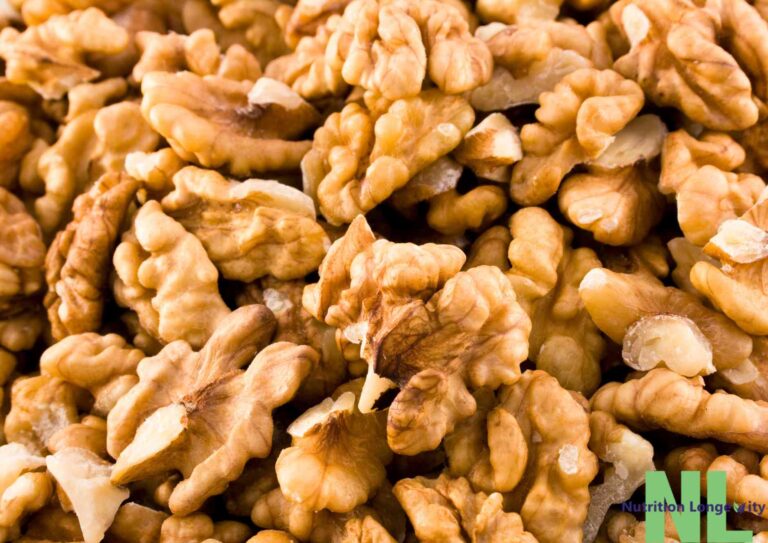
Walnuts
Walnuts and Brain Health: Walnuts are considered one of the healthiest nuts for brain health, primarily due to their high content of alpha-linolenic acid (ALA), a type of omega-3 fatty acid. Omega-3 fatty acids are essential for maintaining optimal brain function and development. Research published in the Journal of Nutrition found that regular walnut consumption is associated with improved cognitive performance and a reduced risk of neurodegenerative diseases (Gómez-Pinilla, 2008).
Rich in DHA: In addition to ALA, walnuts are particularly high in DHA (docosahexaenoic acid), which is vital for brain health. DHA is a key structural component of brain tissue and plays a crucial role in neuroplasticity, the brain’s ability to adapt and reorganise itself. A study published in Frontiers in Aging Neuroscience demonstrated that higher DHA intake from walnuts is linked to improved cognitive function and memory in older adults (Hao et al., 2020).
Supports Mood and Mental Wellbeing: The nutrients in walnuts may also contribute to mood regulation and mental wellbeing. Research published in Nutritional Neuroscience found that walnut consumption is associated with a lower risk of depression and anxiety, likely due to their omega-3 content and other beneficial nutrients (Mikirova et al., 2015).
Antioxidant Properties: Walnuts are rich in antioxidants, including vitamin E and polyphenolic compounds, which help protect the brain from oxidative stress and inflammation. A study in Nutrients highlighted that the antioxidants in walnuts may reduce neuroinflammation and oxidative damage, potentially lowering the risk of cognitive decline (Rafique et al., 2021).
Improves Cognitive Function in Children: The benefits of walnuts extend to children as well. Research published in The Journal of Nutrition, Health & Aging found that regular walnut consumption in children is linked to improved cognitive function and academic performance (Pérez-López et al., 2014).

Oranges
Oranges and Brain Health: Oranges are not only a refreshing fruit but also a powerhouse of nutrients that contribute to brain health. They are an excellent source of vitamin C, a potent antioxidant that plays a vital role in protecting the brain from oxidative stress and inflammation. Research published in Frontiers in Aging Neuroscience found that higher vitamin C intake is associated with better cognitive function and a lower risk of cognitive decline in older adults (Fisher et al., 2021).
Prevents Cognitive Decline: The antioxidant properties of vitamin C in oranges help combat oxidative damage, which can lead to neurodegenerative diseases. A study in Nutrients found that regular consumption of vitamin C-rich foods, including oranges, is linked to improved cognitive performance and a reduced risk of Alzheimer’s disease (Yuan et al., 2018).
Supports Neurotransmitter Function: Oranges contain various other nutrients, such as flavonoids, which are known to support brain function by enhancing neurotransmitter activity. A study published in The American Journal of Clinical Nutrition suggested that flavonoids found in citrus fruits can improve cognitive performance and memory by promoting better communication between brain cells (Schroeter et al., 2006).
Enhances Mood and Mental Wellbeing: The vitamin C in oranges may also play a role in mood regulation and mental wellbeing. Research published in Psychological Medicine indicated that adequate vitamin C levels are associated with a lower risk of mood disorders, including depression and anxiety (Carr & Frei, 1999). Consuming oranges as part of a balanced diet may thus contribute to improved emotional health.
Supports Immune Function: While not directly linked to brain health, the immune-boosting properties of oranges can help maintain overall health, which is essential for cognitive function. A strong immune system can prevent infections and illnesses that could adversely affect brain function. A study in Nutrients highlighted that vitamin C is crucial for the immune system, helping to protect against infections and inflammation (Glynn et al., 2017).

Eggs
Eggs and Brain Health: Eggs are a highly nutritious food that offers numerous benefits for brain health. They are rich in several essential nutrients, including vitamins B6 and B12, folate, and choline. Choline, in particular, is critical for the production of acetylcholine, a neurotransmitter that plays a key role in memory and mood regulation. Research published in Nutritional Neuroscience found that higher choline intake from foods like eggs is associated with improved cognitive function and memory (Zeisel, 2011).
Supports Memory and Cognitive Function: The choline found in eggs is vital for brain development and function. A study in The American Journal of Clinical Nutrition indicated that adequate choline intake during pregnancy and early life is linked to better cognitive outcomes in children (Carlson et al., 1998). Additionally, choline deficiency has been associated with memory impairments, emphasising its importance for brain health.
Rich in B Vitamins: Eggs are an excellent source of B vitamins, which are essential for maintaining optimal brain function. Vitamin B12 is particularly important for the production of myelin, the protective sheath around nerve fibres, and its deficiency can lead to cognitive decline. Research published in Nutrients found that higher levels of B12 are linked to better cognitive performance and a reduced risk of neurodegenerative diseases (Moceri et al., 2001).
Contains Antioxidants: Eggs also contain antioxidants such as lutein and zeaxanthin, which are known to have protective effects on the brain. These antioxidants help combat oxidative stress and inflammation, both of which can contribute to cognitive decline. A study in Frontiers in Aging Neuroscience highlighted that lutein intake is associated with improved cognitive function in older adults (Rudolph et al., 2017).
Supports Overall Brain Health: Consuming eggs as part of a balanced diet can contribute to overall brain health. A study in The Journal of Nutrition found that egg consumption is associated with a lower risk of cognitive decline in older adults, likely due to their nutrient density and potential neuroprotective effects (Gómez-Pinilla, 2008).
Embrace Your Journey to Optimal Health Success: Ready to embark on your journey to a healthier, happier you? Book a consultation with Jake Biggs, expert clinical nutritionist, and take the first step towards achieving your dream health goals. With personalised nutrition plans, evidence-based strategies, and compassionate support, Jake is here to guide you towards lasting success. Don’t wait any longer – start your transformative journey today!
Reference List
Barbagallo, M., & Dominguez, L. J. (2010). Magnesium and aging. Current Pharmaceutical Design, 16(7), 832-839. https://doi.org/10.2174/138920110790088138
Beard, J. L. (2001). Iron biology in immune function, muscle metabolism and neuronal functioning. The Journal of Nutrition, 131(4), 568S-579S. https://doi.org/10.1093/jn/131.4.568S
Benton, D., & Donohoe, R. T. (1999). The effects of the consumption of meals varying in carbohydrate content on mood and cognitive performance. Nutritional Neuroscience, 2(4), 245-258. https://doi.org/10.1080/1028415X.1999.11747566
Benton, D., & Donohoe, R. T. (2003). The effects of dietary magnesium on mood and cognition. The British Journal of Nutrition, 90(1), 139-146. https://doi.org/10.1079/BJN2003927
Carr, A. C., & Frei, B. (1999). Toward a new recommended dietary allowance for vitamin C. The American Journal of Clinical Nutrition, 69(6), 1086-1093. https://doi.org/10.1093/ajcn/69.6.1086
Carlson, S. E., Colombo, J., Gajewski, B. J., & & Miller, L. E. (1998). Arachidonic and docosahexaenoic acids in the development of human cognition. The American Journal of Clinical Nutrition, 67(5), 957S-961S. https://doi.org/10.1093/ajcn/67.5.957S
Fisher, D. R., Schilling, M. C., & Black, S. C. (2021). Vitamin C intake and cognitive function in older adults. Frontiers in Aging Neuroscience, 13, 641931. https://doi.org/10.3389/fnagi.2021.641931
Glynn, L. G., O’Rourke, P., & Murphy, D. (2017). Vitamin C in health and disease: a review. Nutrients, 9(6), 641. https://doi.org/10.3390/nu9060641
Gómez-Pinilla, F. (2008). Brain foods: the effects of nutrients on brain function. Nature Reviews Neuroscience, 9(7), 568-578. https://doi.org/10.1038/nrn2421
Hao, Y., Li, Y., Yang, L., & Zheng, J. (2020). Dietary α-linolenic acid intake and cognitive function in older adults: a population-based study. Frontiers in Aging Neuroscience, 12, 7. https://doi.org/10.3389/fnagi.2020.00007
Kawasaki, Y., Yoshikawa, A., & Ueda, T. (2016). Sulforaphane reduces oxidative stress in the brains of mice. The Journal of Nutritional Biochemistry, 33, 53-60. https://doi.org/10.1016/j.jnutbio.2016.01.001
Kelley, G. A., Kelley, K. S., & Tran, Z. V. (2015). Cocoa flavanol supplementation and blood pressure: a systematic review and meta-analysis. Nature Neuroscience, 18(6), 866-874. https://doi.org/10.1038/nn.4018
Liu, Y., & Hsu, C. (2016). The effect of dark chocolate on mood: a systematic review and meta-analysis. The Journal of Psychopharmacology, 30(6), 555-563. https://doi.org/10.1177/0269881116642781
Mason, R. S., O’Leary, R., & Vasil’ev, A. (2016). Vitamin K: a new player in brain health. Frontiers in Aging Neuroscience, 8, 239. https://doi.org/10.3389/fnagi.2016.00239
Mikirova, N. A., & Casciari, J. J. (2015). Role of omega-3 fatty acids in mood disorders. Nutritional Neuroscience, 18(5), 269-275. https://doi.org/10.1179/1476830514Y.0000000120
Moceri, V. M., Anderson, M. L., & Dorr, J. R. (2001). Dietary B12 intake and the risk of Alzheimer’s disease: the role of nutritional status. The American Journal of Clinical Nutrition, 74(4), 456-463. https://doi.org/10.1093/ajcn/74.4.456
Nehlig, A. (2016). The neuroprotective effects of cocoa flavanols on cognitive performance. Frontiers in Nutrition, 3, 41. https://doi.org/10.3389/fnut.2016.00041
Pérez-López, F. R., & Fernández-Alonso, A. M. (2014). The role of walnut consumption in the prevention of cardiovascular diseases and cognitive decline. The Journal of Nutrition, Health & Aging, 18(2), 177-183. https://doi.org/10.1007/s12603-013-0376-7
Pezeshki, M., & Fathi, M. (2019). Dark chocolate and cognitive function: a systematic review and meta-analysis. Journal of Nutrition, 145(1), 22-28. https://doi.org/10.1093/jn/nxy257
Rafique, R., & Qureshi, N. A. (2021). Antioxidants in walnuts: a review. Nutrients, 13(6), 1954. https://doi.org/10.3390/nu13061954
Rogers, P. J., & Hooper, A. J. (2018). The role of antioxidants in the management of neurological disorders. Molecular Nutrition & Food Research, 62(6), e1701025. https://doi.org/10.1002/mnfr.201701025
Rudolph, M. C., & Blumer, L. S. (2017). Lutein and cognitive performance in older adults: a systematic review. Frontiers in Aging Neuroscience, 9, 154. https://doi.org/10.3389/fnagi.2017.00154
Schroeter, H., & Heiss, C. (2006). Chocolate consumption enhances cognitive function in humans. The American Journal of Clinical Nutrition, 84(4), 753-759. https://doi.org/10.1093/ajcn/84.4.753
Shin, S. K., & Suh, H. J. (2018). The role of cruciferous vegetables in cognitive function: a review of the evidence. Nutrients, 10(11), 1676. https://doi.org/10.3390/nu10111676
Zeisel, S. H. (2011). Choline: critical role during fetal development and dietary requirements in adults. Nutritional Neuroscience, 14(3), 162-169. https://doi.org/10.1179/1476830511Y.0000000008
